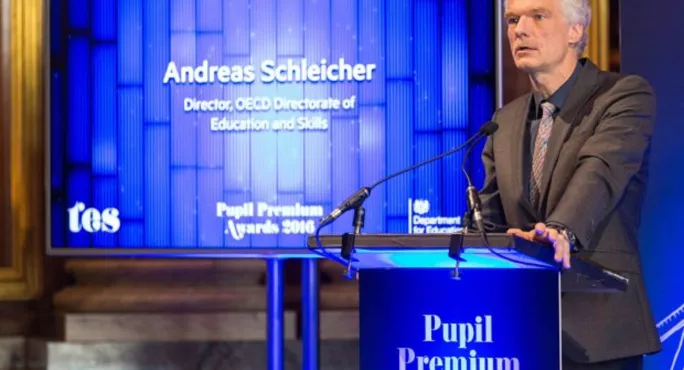The Pupil Premium Awards are a great opportunity to give recognition to schools that are making the biggest difference for disadvantaged young people. This year’s event took place on 12 May in the magnificent Drapers’ Hall in the City of London, its gilded ceiling making the greatest possible contrast with the lives of most of these young people but the evening proved a fitting reward for the schools that had been selected as finalists.
A year ago in the same hall, the then deputy prime minister, Nick Clegg, and minister for schools, David Laws, had been there throughout the ceremony to emphasise the importance of the pupil premium policy - perhaps the Liberal Democrats’ greatest success in the coalition government - in their last engagement before the general election campaign began.
A year is a very long time in politics. This year, junior education minister Sam Gyimah reiterated the Conservative government’s commitment to the pupil premium and then departed for another engagement, leaving the prizes to be presented by the chair of the panel of judges, Andreas Schleicher (pictured), the director of education at the Organisation for Economic Cooperation and Development and a man with an impressively comprehensive view of education across the world. (For the full list of winners click here.)
Andreas put the pupil premium in an international context. “If you come from a poor background, you have only got one chance,” he told the audience. Many countries have an element of formula-based funding for schools for disadvantaged children. Pupil premium, however, is unique in the extent of the autonomy that it gives to individual schools. “I find the pupil premium a truly remarkable approach,” he concluded. Praise indeed from the man that Michael Gove described as the most important person in world education.
Diversity of strategies
He was particularly impressed with schools in England that have made pupil premium the business of everyone in the school, as he put it, and have used granular data to connect pupil premium strategies to impact. He has been struck by the diversity of strategies that schools, using their autonomy, have used to combat the barriers to learning for their disadvantaged pupils.
Andreas also noted that English schools are using evidence much more than schools elsewhere in Europe to decide on the most effective way to spend this kind of funding. It is interesting, therefore, that all of this year’s winners (congratulations!), used evidence of what is working elsewhere, and nearly all their applications referenced the Education Endowment Foundation toolkit.
Other best practice in the use of pupil premium to make maximum impact can be found in the 2015 National Foundation for Educational Research report, in the Ofsted report on pupil premium in 2013 or in my blog from August 2015.
With this evidence of what is working in other schools, the way is open for all schools to raise the attainment and improve the life chances of disadvantaged young people - and perhaps win a pupil premium award in 2017.
The excellent practice in award-winning schools can be researched through the Pupil Premium Awards website.
John Dunford is chair of Whole Education, a former secondary head, general secretary of the Association of School and College Leaders and national pupil premium champion. He tweets as @johndunford
Want to keep up with the latest education news and opinion? Follow TES on Twitter and like TES on Facebook




